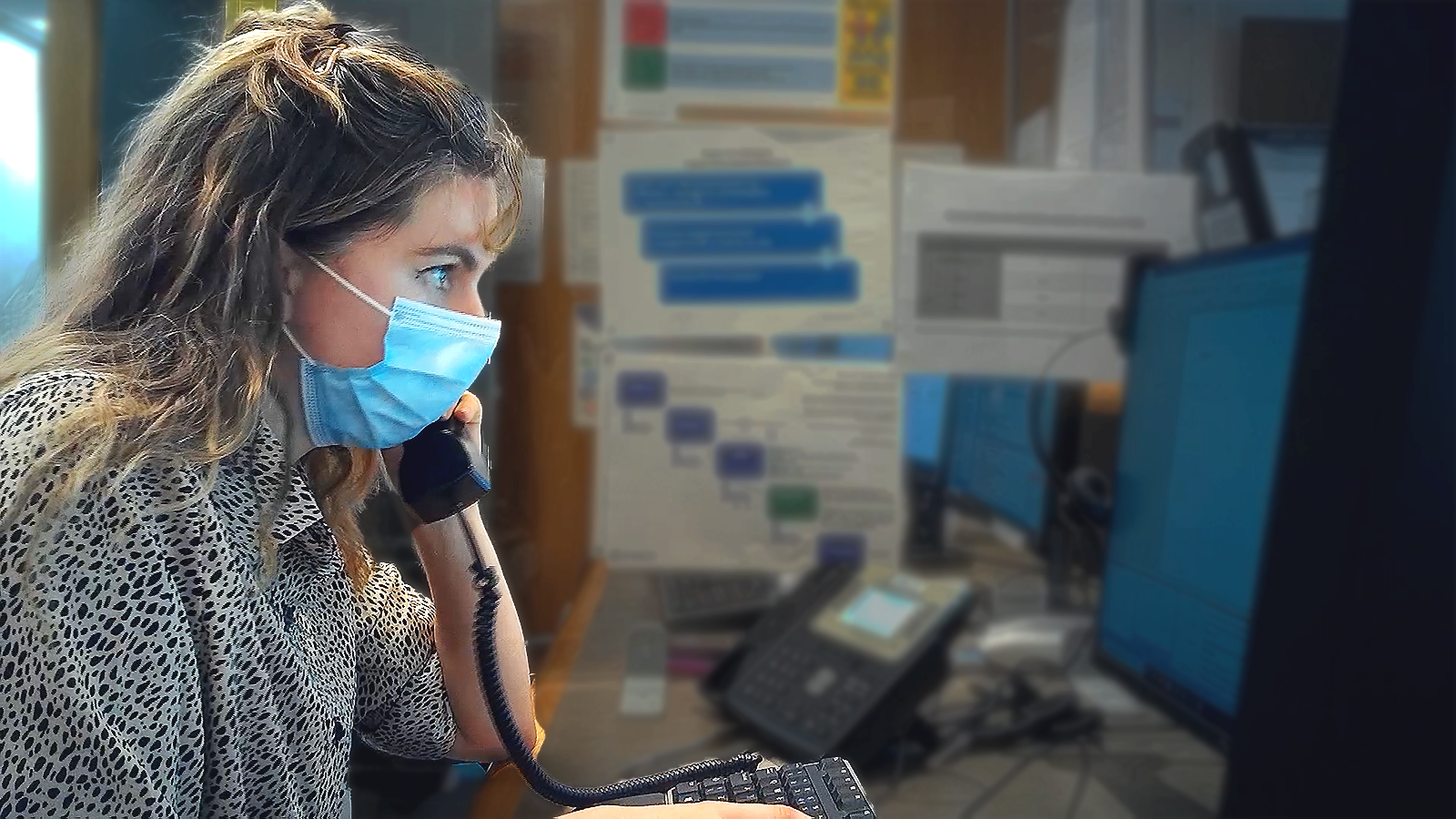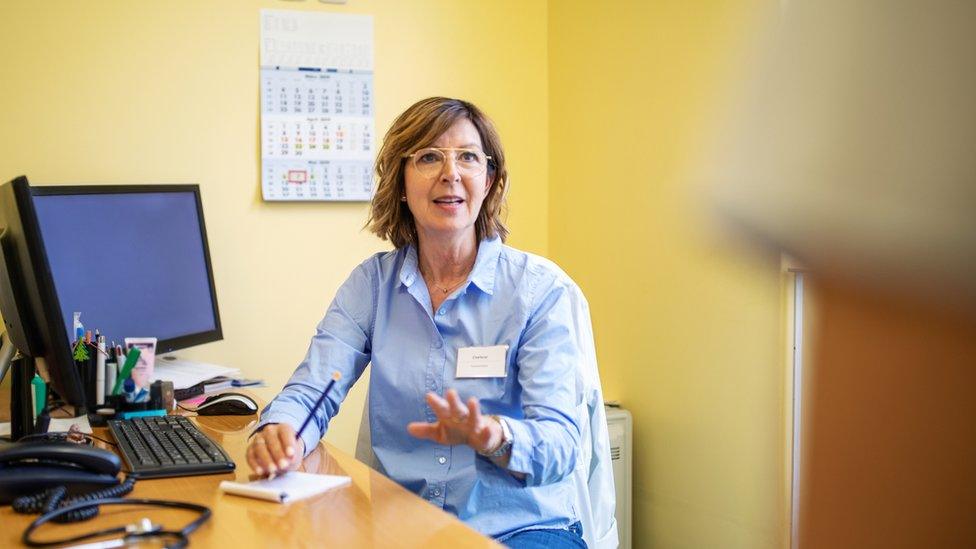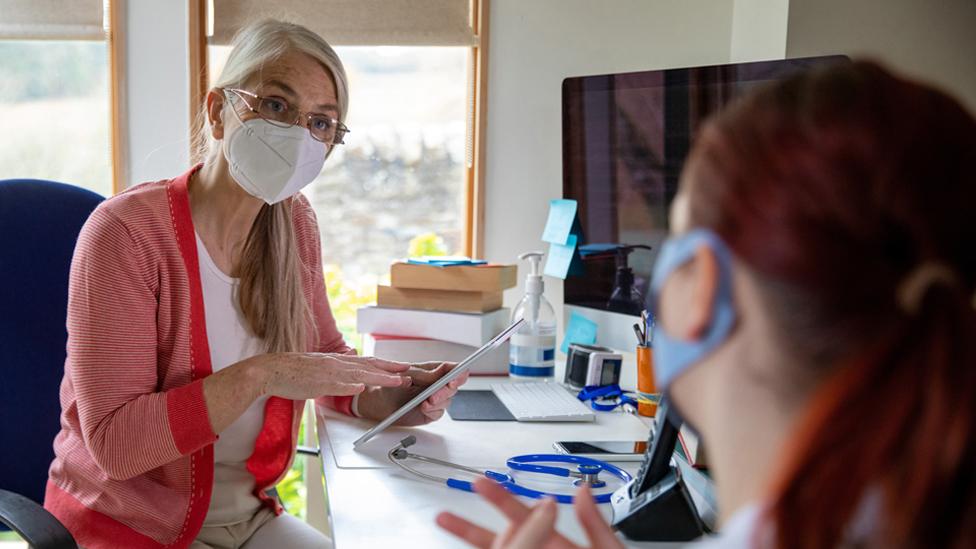Operose Health: What I saw working undercover at a GP surgery
- Published

For six weeks I worked undercover as a receptionist in a GP surgery owned by Operose Health, the UK's biggest GP chain. Most practices in England are privately owned by GP partners, but a rule-change in 2007 allowed bigger companies to buy up partner-led surgeries.
Operose Health has grown rapidly in recent years - it has spent millions buying GP practices. It now runs 70 surgeries with nearly 600,000 patients, making it the biggest GP provider to the NHS.
Across the UK, there is a shortage of GPs and general practice is under unprecedented pressure. Former Operose employees who spoke to Panorama - a dozen doctors, nurses, pharmacists and other staff - said they believed patient safety was being put at risk.
Our investigation found the company let less qualified staff see patients, rather than doctors, without adequate supervision.
Operose denies profit is being prioritised ahead of patient care and says it has a clear process of supervision.
This is the diary of my time working in a busy Operose GP practice in London.

Thursday 7 April - 'We run on locums'
It's my second shift at the practice and already I'm dealing with a serious complaint. A patient came in and told me his GP had been absent and unreachable through his struggles with mental health. Last year, he had spoken to his GP but after this appointment he hadn't had any engagement from the practice.
He said he hadn't been able to get his new prescription, or to create a mental health plan with his GP. The patient said he felt completely abandoned.
The other receptionists are telling me this practice "runs on locums", meaning a lot of the GPs who work here are like freelancers - only working a shift here or there.

Monday 11 April - The 'cheaper' physician associates
Today I met one of the less-qualified clinicians known as a physician associate (PA). I could only speak to her for a few minutes as she rushed to her next appointment, but she quickly opened up about how she felt she was being treated exactly like a GP.
She appeared stressed, telling me that from day one on the job she had been thrown in as if she had the experience of a GP, despite this being her first job out of training.
I hadn't heard of a PA before this. I asked my manager and they told me they were like GPs but couldn't prescribe. I asked why we wouldn't just have more doctors and my managers told me that each PA cost less than half that of a GP and were therefore cheaper.


Wednesday 20 April - The 'skim-reading' team
At the practice where I'm working, there is a team of people who process documents for about 30 Operose GP practices. While it's common in GP practices for non-medical staff to deal with reports, test results and hospital letters, this team doesn't have easy access to a doctor if they have questions. They have to decide on their own which documents should be filed away and which require action by a GP or pharmacist.
Staff in the central admin team say they're sometimes being told to process complex medical documents. They tell me they're concerned they'll make mistakes, but that management tell them to hit their targets.
They tell me they skim-read, even if they don't understand the information they are looking at. This team is the first point where these documents are read and, if something is missed, it could mean delaying or risking vital patient care.

Tuesday 26 April - Squeezing the GPs
I've managed to get a bit of time with one of the regular locum GPs at the practice. I ask about the PAs. He tells me PAs aren't the same as GPs and they actually need help and supervision.
The doctor tells me it's an issue at the practice and that he had asked for time out of his daily shifts to talk through cases and support the PAs' official supervisor, known as the clinical lead. He says this was refused by management in the interest of "squeezing" the most appointments for patients as possible.

Friday 29 April - The GP director is 'always here'
Today a patient came in and complained that he was never able to see his named GP, who was also the GP director. As I began to explain that this doctor doesn't come into the practice, that I had never seen him and that other staff had told me that he comes in rarely, I was swept away from the front desk.
One of the other receptionists told me never to tell patients that this doctor isn't at the practice or available to patients. I went to tell the practice manager of my "mistake". I was told that this doctor was "always here" - available by phone, despite not being physically present in the practice.

"One of the receptionists yelled asking why there weren't any doctors"
Tuesday 3 May - The day with no appointments
Today there wasn't a doctor or physician associate at the practice able to deal with patients with appointments. My co-workers and I panicked. We saw calls piling up - from 40 at 08:00, to dozens more soon after.
One of the receptionists yelled from the back asking why there weren't any doctors. My colleague next to me said it was a joke and we shouldn't be open.
Unusually, we were told we could book some patients in for the following day. But that had a knock-on effect. With the following day's appointments now already booked, it meant people calling from 08:00 the next morning, expecting to get an appointment, were also disappointed. We could only tell them try again the next day.

Friday 6 May - The end of a bad week
We didn't have a single day this week with more than two full-time doctors available for appointments for a practice with 20,000 patients. I noticed that the same patients were calling up every day, sometimes several times, becoming more desperate for any solution.
I once again had to tell them to try again at 08:00 the next day. All GP practices are under pressure, but NHS data shows that at my surgery there are about half the number of full-time equivalent doctors as there are at an average NHS surgery of this size.
Every morning we receptionists - as the first point of contact at the practice - had to endure hours of patients taking out their frustrations on us. Nothing could have prepared me for turning away patients. I believe much of it could have been solved if we just had a few more doctors.

Monday 9 May - Documents unseen, six months on
I was told by workers from the central admin team, who process medical documents for about 30 Operose surgeries, that there was a backlog of more than 1,000 documents needing doctors' attention. They tell me that the paperwork has been flagged for action on the computer system, but have yet to be seen by a doctor or pharmacist.
The documents are sent electronically to local practices, but the central team can still see which requests have not been actioned. I was told some of the correspondence had been waiting to be seen for six months.
Staff told me these were important documents - including diagnoses, prescription changes and urgent information GPs needed to be aware of.
The admin team told me they were concerned for the safety of patients. They showed me an example, a request to change the medication for a patient. It hadn't been looked at for five months, meaning that the patient could have been on the wrong medication.


Wednesday 11 May - Final day
As I took the morning calls, I felt relieved it was my last time having to answer the phone to frustrated patients. But I felt I was also abandoning them, as I wanted to try my best to help them when I could.
After six weeks working undercover, I left the practice feeling that its patients were getting a raw deal.

BBC Panorama approached Operose Health about the things I saw and was told while working undercover.
In a written statement, the company denied profit was being prioritised ahead of patient care. At the practice where I worked it says it has increased the GP headcount to its highest level ever.
Operose said that on Tuesday 3 May - the day with no appointments - its clinical systems showed "there were five GPs working that day" at the practice, including one "providing additional remote cover". But when we asked if those doctors were available to book appointments with, the company didn't respond.
Across all its practices, Operose says it has recruited 38 GPs in the past 12 months and is in the process of recruiting 14 more.
Operose says its document workflow helps ensure clinicians receive accurate and well-coded documentation in a timely manner. And that the process is audited monthly for quality and safety.
Operose says it is the largest employer of salaried General Practitioners (GPs) in England and invests heavily in recruiting, training and rewarding GPs and other clinical and non-clinical staff.
At the practice where I worked, Operose says there is a clinical lead available to help answer physician associates' (PAs) questions - and that it has a clear process of supervision and invests heavily in PA training.
Operose says it is not over-reliant on physician associates and its use of PAs is in line with the NHS long-term plan.
It says 97% of its practices are rated "good" or "outstanding" by the Care Quality Commission - and that it works "in the best interests of patients, providing access to the highest quality of care".
Follow BBC Panorama on Twitter, external

Have you been affected by any of the issues raised here? You can get in touch by emailing haveyoursay@bbc.co.uk, external.
Please include a contact number if you are willing to speak to a BBC journalist. You can also get in touch in the following ways:
WhatsApp: +44 7756 165803, external
Tweet: @BBC_HaveYourSay, external
Or fill out the form below
Please read our terms & conditions and privacy policy
If you are reading this page and can't see the form you will need to visit the mobile version of the BBC website to submit your question or comment or you can email us at HaveYourSay@bbc.co.uk, external. Please include your name, age and location with any submission.

Related topics
- Published1 June 2022

- Published31 May 2022

- Published9 June 2022
